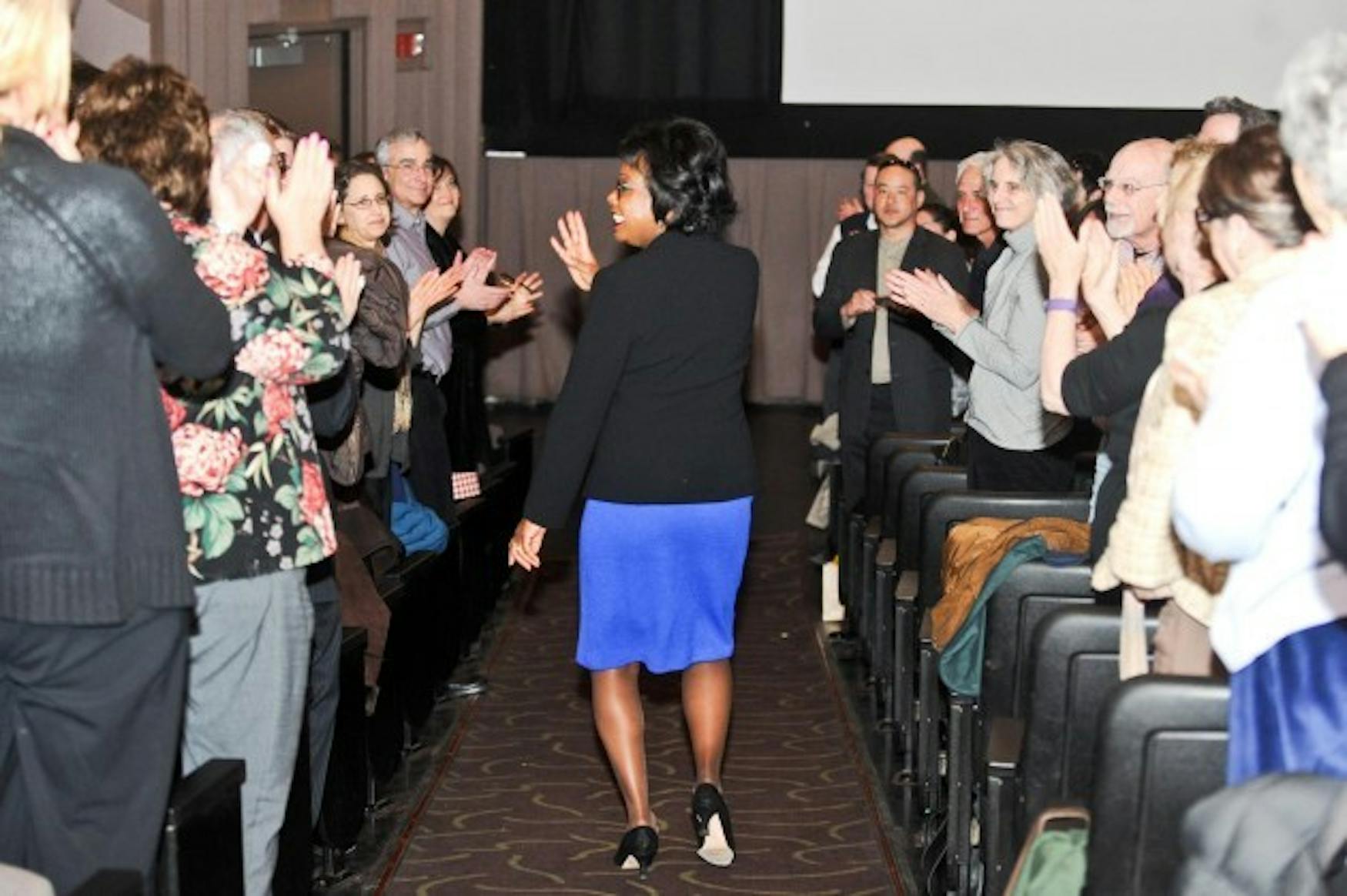Using past for progress
Prof. Anita Hill speaks at a Waltham screening of new film
At 7:31 a.m. on a Saturday morning in 2010, nearly 20 years after she spoke out against the sexual misconduct of the then soon-to-be Supreme Court Justice Clarence Thomas, Prof. Anita Hill (Heller) received a voicemail that at first, she thought was a prank. On the other end of the line was Virginia Thomas, the wife of Clarence Thomas.
"I just wanted to reach across the airwaves and the years and ask you to consider something. I would love you to consider an apology sometime and some full explanation of why you did what you did with my husband."
That phone call was the opening footage of Hill's new documentary Anita. Hill participated in a question-and-answer session moderated by Senior Vice President for Communications Ellen de Graffenreid following a screening of the documentary on Friday at the Landmark Embassy Cinema in Waltham. The film was directed by Academy award-winning filmmaker Freida Lee Mock.
Hill also appeared at an event related to her book on Thursday moderated by Florence Graves, director of the Schuster institute for Investigative Journalism.
The showing was one of a string of recent media appearances Hill has made, including an appearance on The Daily Show in march since the film's commercial release one month ago, though the film premiered at the Sundance Film Festival in 2013.
Hill is a senior adviser to the provost at Brandeis and a professor of social policy, law and women's studies at the Heller School for Social Policy and Management. She graduated from Yale University with a law degree in 1980.
Much of the film pulls viewers back in time to Hill's testimony before the Senate Judiciary Committee's Supreme Court confirmation hearing of Clarence Thomas in 1991. Hill's testimony exposed a history of habitual harassment by Thomas. During the two years she worked for Thomas, she was subject to a slew of inappropriate behaviors and remarks. She terminated her work in 1983, but when Thomas was nominated by former President George H. W. Bush to succeed Thurgood Marshall as Supreme Court Justice, Hill was called to testify.
However, the hearing had the opposite outcome from what many expected. Although many were horrified by the brutal and sexually explicit interrogation, many were encouraged to speak out. "It pushed people to have conversations and women to start telling their stories in ways that they had never told before," Hill said.
"When I was approached by Freida Mock to make this film, an entire generation had either left the workplace or was on the verge of moving into the workplace where many of the behaviors we had thought we had gotten rid of were still happening," said Hill during the question-and-answer portion of the night.
According to Hill, workplace sexual harassment lessened directly after the hearing. "I figured that if it's possible 22 years ago then it's still possible today for there to be change and so maybe this film could spark or inspire us to take the next step," Hill said.
The film caused viewers to relive some of the more uncomfortable moments of the testimony. The distance of time allowed audience members to laugh at the absurdly hostile nature of certain members of the committee, most notably that of Sen. Arlen Specter.
Rather than simply recounting the events of the hearing, the documentary reflects on the progress made in transforming the conversations and policies around sexual assault. "The film is not about as I like to say 'relitigating' the hearings of 1991," Hill said. "It gives us an opportunity to look at what we saw in 1991 and examine that against what processes are in place now."
The film also highlights aspects of her personal life, drawing from footage and interviews of her family and friends. But in addition her close-knit support system, she had something else supporting her during the hearing that she considers crucial. "I had an education and developed skills that made me feel like I could undertake the challenge of testifying," Hill said.
A strong support network is something Hill has valued since becoming a professor at Brandeis in 1998.
"The people I have met since moving to the Boston area have been critical to my even being able to make this film," she said.
Hill stressed the importance of having the tough conversations with the future generation. "We've spent years preparing women and giving them the tools and the skills and the knowledge to come forward when they're experiencing sexual harassment. ... We talk to our daughters now, but do we talk to our sons?" she said.
For Hill, just because the situation has improved since 1991 doesn't mean we don't have a long way to go. "Everybody is better off when we're working in a place that is free of sexual harassment of women," Hill said. "We need to imagine a workplace where [sexual harassment] is not the norm but where it's an anomaly."
Julia Karant '14, who attended the screening, felt a sense of pride for being in the same community as Hill. "I've never actually seen Anita Hill speak before even though I've gone to Brandeis for four years. ... The documentary presented a lot of sides of the whole situation and I feel very lucky to go to a school where she teaches," she said.
In the present, a public hearing would probably not become the media spectacle that it was in 1991, as it would be dealt with privately before reaching a public hearing. But for Hill, the essential question regarding the hearing doesn't dwell in the past.
"My question is not whether that confirmation hearing would be repeated so much as are we repeating some aspects of that in the ways we process cases today?" Hill said.



Please note All comments are eligible for publication in The Justice.